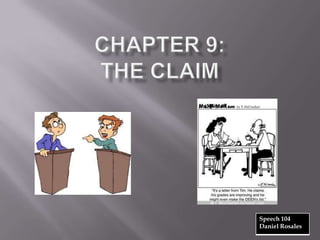
Speech 104 chapter 9 the claim
- 1. Chapter 9: The Claim
- 2. What is the claim? A statement worded against the status quo that is the focus of an argument The main point, the thesis, the controlling idea “What is the advocate trying to prove?”
- 3. Seven Key Characteristics of a Claim Claims are phrased as statements, not questions Goal is to promote debate. Questions only promote discussion Claims should be phrased so that both sides have an equal opportunity to advocate, support, and defend their positions Should be unbiased, free from loaded, ambiguous, and high intensity language Properly phrased claims should be as specific as possible The best claims indicate Who, What, When, and Where Must be phrased against the status quo Want to stir up controversy
- 5. Debate whether the claim should be accepted or rejected
- 6. The wording of a claim never changes
- 7. An effective claim promotes a pro/con argumentative environment
- 9. Types of Claims Three types of claims Claim of Fact Claim of Value Claim of Policy
- 10. Claims of Fact Asserts that something has existed, does exist or will exist The goal is that something that is currently not accepted as a fact should be or that something that is currently considered a fact should no longer be To argue against, get the audience to deny acceptance of the new fact or defend the status quo May be assertions about the past, present, or future Examples: Enforcement of drunk driving laws has led to fewer traffic deaths. Exercising will help you keep in shape
- 12. Claims of Policy Something should or should not be done by someone about something Key Words: “Should” or “Should not” Examples: All professional athletes should be randomly drug-tested The government should increase funding for stem cell research
- 14. Qualitative statements that focus on judgementClaim of Policy: Something should or should not be done Statements that focus on actions that should be taken to change the status quo
- 15. Good critical thinkers, those who desire constructive conflict resolution, do their best to phrase a claim effectively A properly worded Claim can become the basis for successful conflict resolution Good, effective, and potentially successful arguementation must begin with a mutually acceptable and correctly stated claim Conclusion